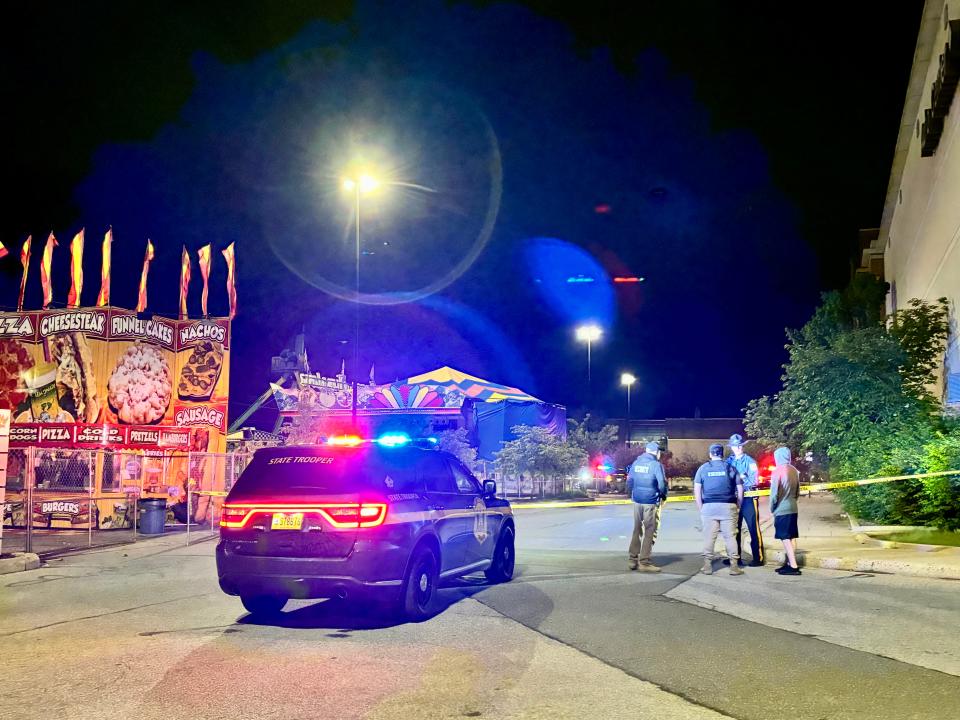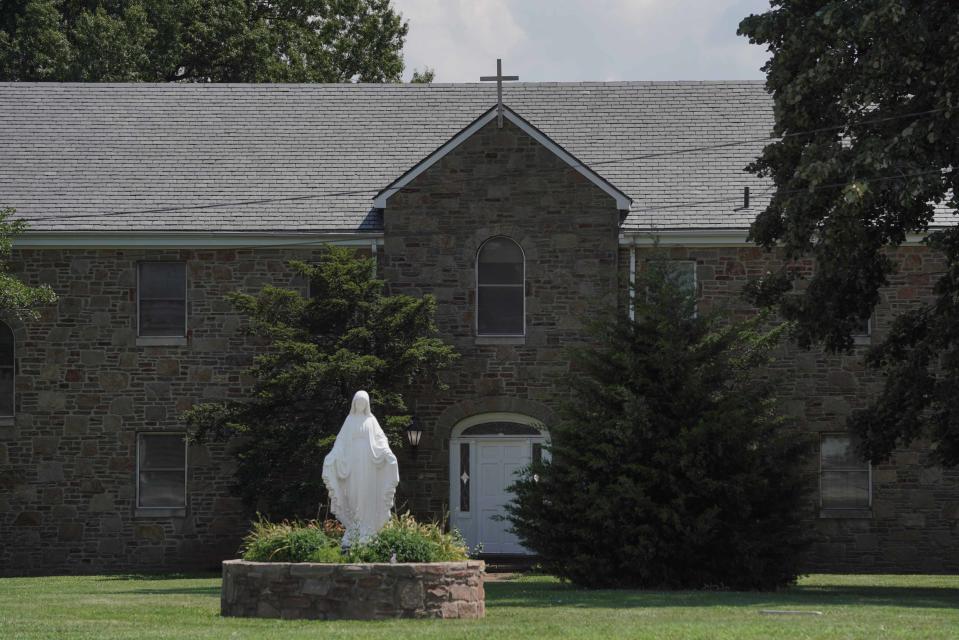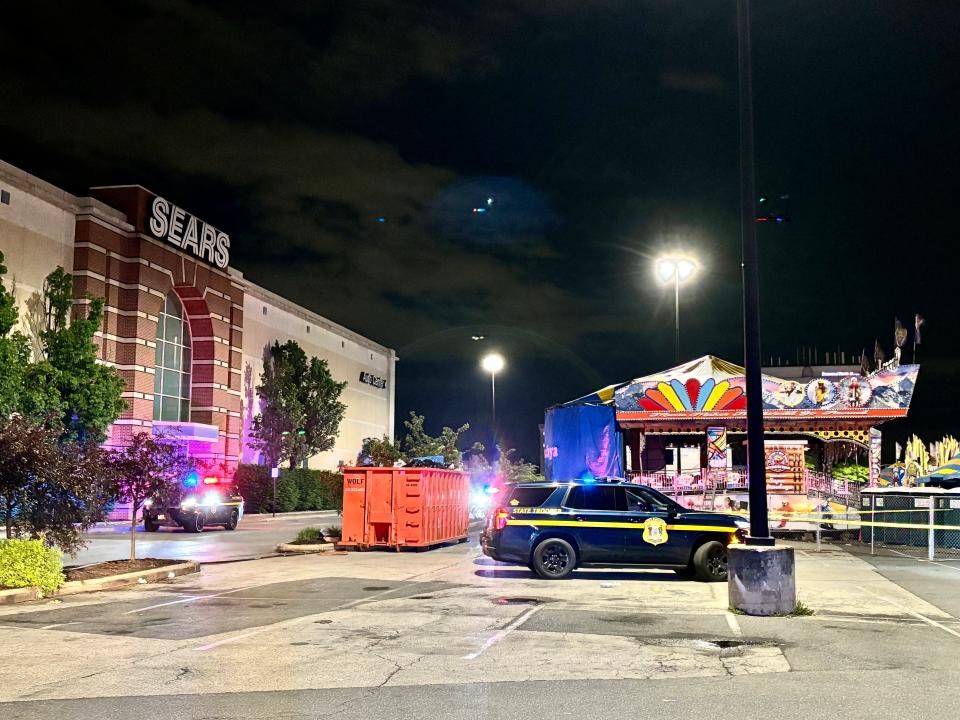Concord Mall carnival closes after fatal shooting. Will summer carnivals go away completely?
Eight days before two teens were shot outside a carnival at Concord Mall in Brandywine Hundred, Delaware State Police were called to the same event.
It was about 8:45 p.m. on opening day and the carnival had been running for less than four hours. “Multiple fights” broke out between teens, state police said, requiring a police response.
Just after the initial fights were split up, another began. That one occurred in front of troopers and led to a 15-year-old being arrested for disorderly conduct.
While state police said there were “no reports of weapons involved” in the May 3 incidents, the fights shook attendees.
One local mom said as soon as her kids were off the Ferris wheel, they left. Another parent said festival-goers ran from the event and those on rides “started screaming to let them off.” Speculation about what happened, including whether firearms were involved, swirled on social media.

Then, on Saturday night – one week and one day later – another fight broke out. This time, however, at least one person fired a gun, killing a 16-year-old boy and injuring a 17-year-old.
Despite being slated to run until May 19, the carnival has been shut down for good in Delaware, organizers confirmed. By Monday afternoon, the event’s website had removed the Concord Mall location and a note thanked attendees “for a great 10 days.”
BACKGROUND: 16-year-old boy dead, 17-year-old injured following shooting outside Concord Mall
These kinds of incidents certainly aren’t unique to this carnival, nor are they confined to Delaware.
A quick Google news search yields numerous stories about incidents at both local festivals and those held elsewhere across the country. Many of the articles detail fights breaking out between teens, and the events later being shut down.
With festival season upon us, organizers across the region are weighing the safety risks involved in these often-beloved events. As they gather to plan what are intended to be joyous festivals, they’re increasingly forced to ask: Is there any way to prevent fights or shootings without shuttering these festivals completely?
‘Just bound to happen’
The short answer, said Marple Township, Pennsylvania Police Chief Brandon Graeff, is probably not. The longer answer, he said, is more nuanced.
Just last week, Broomall Fire Company in Marple Township announced it would be discontinuing its annual carnival, a community staple for nearly three decades. In a letter posted to Facebook, the department cited “attendee behavior” as the main driver of its decision.
The choice wasn’t an easy one, the letter said. Not only was the event a fundraiser for the fire company, but it was a “community tradition.”
Yet ensuring attendee safety had just become too difficult.
It wasn’t for a lack of trying, the letter said.
In the last several years, the fire department has tried to mitigate public safety concerns by closing earlier each night. It had installed a fence around the carnival. More police were added.
But even with no fights this year – “and by the grace of God, no stabbings, shootings, you name it,” Graeff said – safety concerns persisted.
“In this day and age, you have that palpable sense that we're just one incident away from what happened down there in Delaware,” Graeff told Delaware Online/The News Journal Monday morning.
“Or look at what happened in Aston a couple years ago,” he added, referring to a large brawl that led to a stampede. “It’s just bound to happen.”
Broomall Fire Company is far from the only event organizer that has decided the only way to truly ensure public safety is to close.
In November, St. Helena's Catholic Church canceled its annual spring festival following several years of incidents.

Like Broomall Fire Company, the church had taken steps to bolster safety. It had increased security and fenced in the carnival grounds.
But after mass panic in 2022 over what was believed to be gunshots and the ransacking of a nearby Wawa last year, organizers made the decision to cancel the event.
"We don't want anyone to be hurt," St. Helena's Pastor Monsignor Stanley Russell said at the time. "We don't want any damage being done."
READ: The end of a 60-year tradition: St. Helena's ends annual carnival over safety concerns
Graeff said it’s not surprising that organizers are increasingly deciding to shut down annual events, no matter how discouraging it might be.
“It stinks, it really does,” he said. “But we're in such a litigious society … that when something does happen, guess who's gonna get dragged through the mud?”
Shutting down an immediate option, but longer-term fixes possible
Though discontinuing an event is a relatively quick public safety fix, Graeff said he doesn’t believe it’s the only option – and it certainly doesn’t get at the root of the issues.
Shutting down one event means the underlying problems that lead to fights will likely just migrate elsewhere. But, he said, it’s often the easiest solution because “we’re a society based on immediate gratification.”
“We want a solution now and it has to happen overnight,” he said.
Graeff believes one of the issues with events such as carnivals is a lack of parental oversight and involvement. He said parents are dropping off their young teens and “it’s, ‘call me when you’re done.’”
(Fights and disorderly behavior are one of the reasons Christiana Mall now requires teens 17 and under to be accompanied by a parent or “supervising adult” after 3 p.m. on Fridays and Saturdays.)
“If you raise your kids right, chances are, you still may have behavior issues,” Graeff said. “But if they're not raised right, it's going to be the Wild West.”
Still, more involved parenting alone isn’t going to stop fights, experts say. Teens – whose brains are not yet fully developed and are more impulsive than adults – have always gotten into arguments.
Instead, said Steve Adelman, a Connecticut-based attorney and event safety expert, society needs to look at what causes lethality when these kinds of incidents do occur. In most cases, he said, it’s the presence of weapons.
He pointed to the February shooting at the Kansas City Chiefs victory parade. Much like at Saturday night’s carnival shooting in Delaware – which occurred in the parking lot outside the fenced-in event – “the shooting there wasn't actually part of the parade.”
“It was a beef that a couple of teenagers got into and unfortunately, they were armed,” Adelman said. “The problem wasn't the argument, because people get into arguments all the time. The problem was that teenagers had guns.”

One of the reasons shootings and stabbings rarely happen at events like the Delaware State Fair or inside sports arenas, Adelman said, is because attendees are screened for weapons. Fights still occur, he said. They’re just usually not as deadly.
While installing metal detectors or using hand-held wands might help mitigate the lethality of fights (and people might leave weapons at home if they know they’re going to be screened), Adelman noted that it’s not always practical – especially for smaller events.
“Is it really realistic to expect somebody putting up a temporary event in a mall parking lot – probably with a very small profit margin – to pay hourly security guards and staff them with handwands?” Adelman said.
The answer, he argued, is no. Rather, he said, deadly encounters occur because “of our perverse current interpretation of the Second Amendment to the U.S. Constitution.”
(Concord Mall carnival organizers told Delaware Online/The News Journal on Tuesday that there were metal detectors and security guards at the event.)
“We allow people to have guns with very few restraints, and I think that is the right lens through which to see this,” Adelman said.
Because teenagers cannot legally carry handguns, minors who obtain firearms have already broken the law. Thus, many argue that stricter gun measures will have no effect on those who already disregard the law.
Yet data from the Bureau of Alcohol, Tobacco, Firearms and Explosives show that states that have stricter gun laws are not usually the ones supplying the majority of crime guns.
New Jersey, for example, has long had some of the strictest gun laws in the country. Of the more than 3,500 crime guns traced in that state in 2022, only 17.2%, or 609 firearms, originated in New Jersey.
By contrast, Delaware is its own source state.
Of the 1,369 firearms traced in Delaware in 2022, 68.9%, or 943, came from Delaware. The First State has long had lax gun laws, though that’s changed some in recent years.
GOVERNOR TO SIGN LAW: Delaware Senate passes 'permit to purchase' handgun bill along party lines
Adelman acknowledged that stricter gun laws don’t mean shootings won’t happen or people who cannot legally possess a firearm won’t find a way to get them. But, he said, it can make it more difficult – which, coupled with other longer-term solutions, can ultimately help curb violence.
“At the end of the day, I don't have an easy answer for you,” Adelman said of violence at events. “But I can say, it's not about carnivals.”
Got a story tip or idea? Send to Isabel Hughes at ihughes@delawareonline.com. For all things breaking news, follow her on X at @izzihughes_
This article originally appeared on Delaware News Journal: Delaware carnival shooting reveals growing challenge for events

